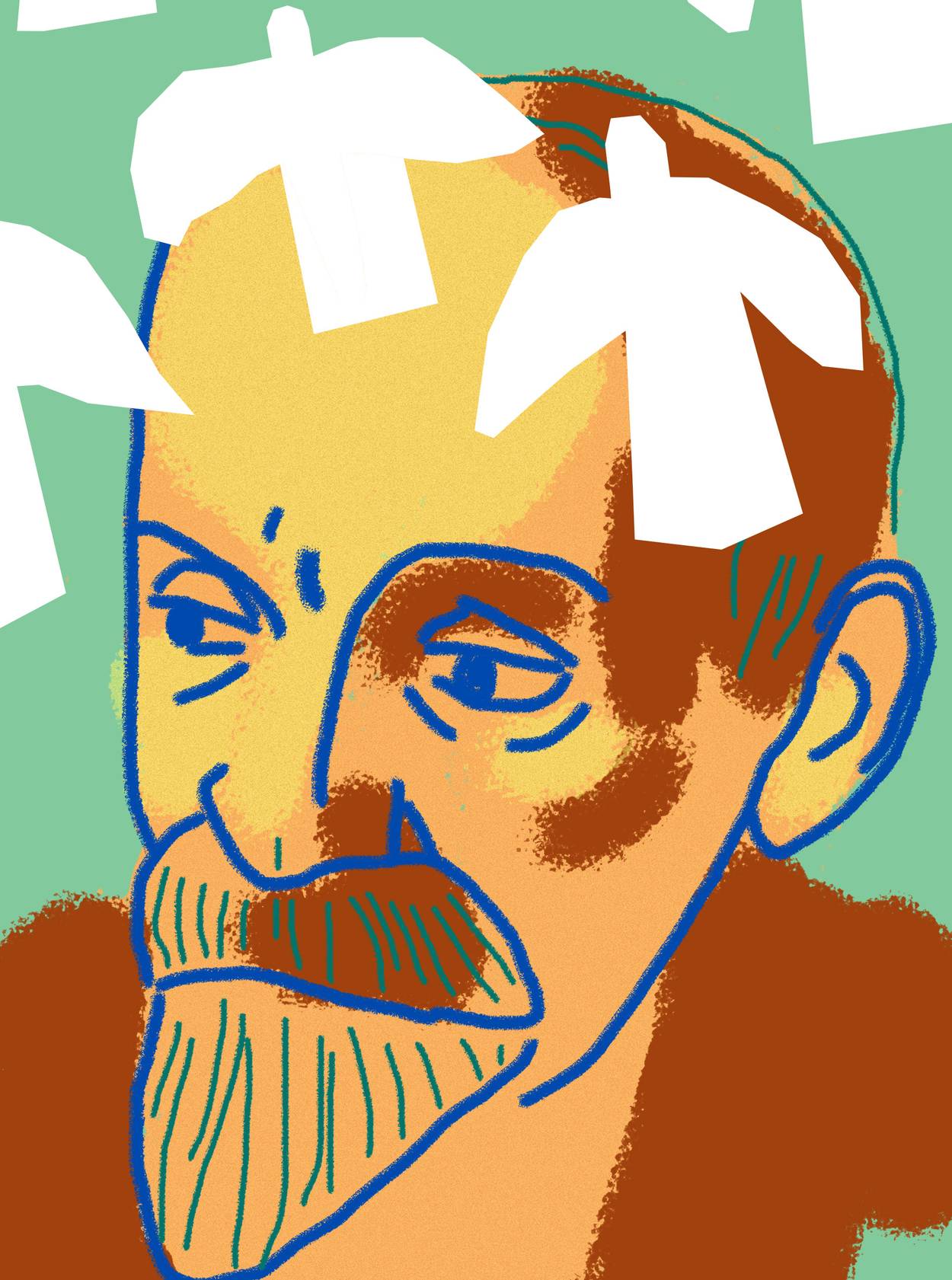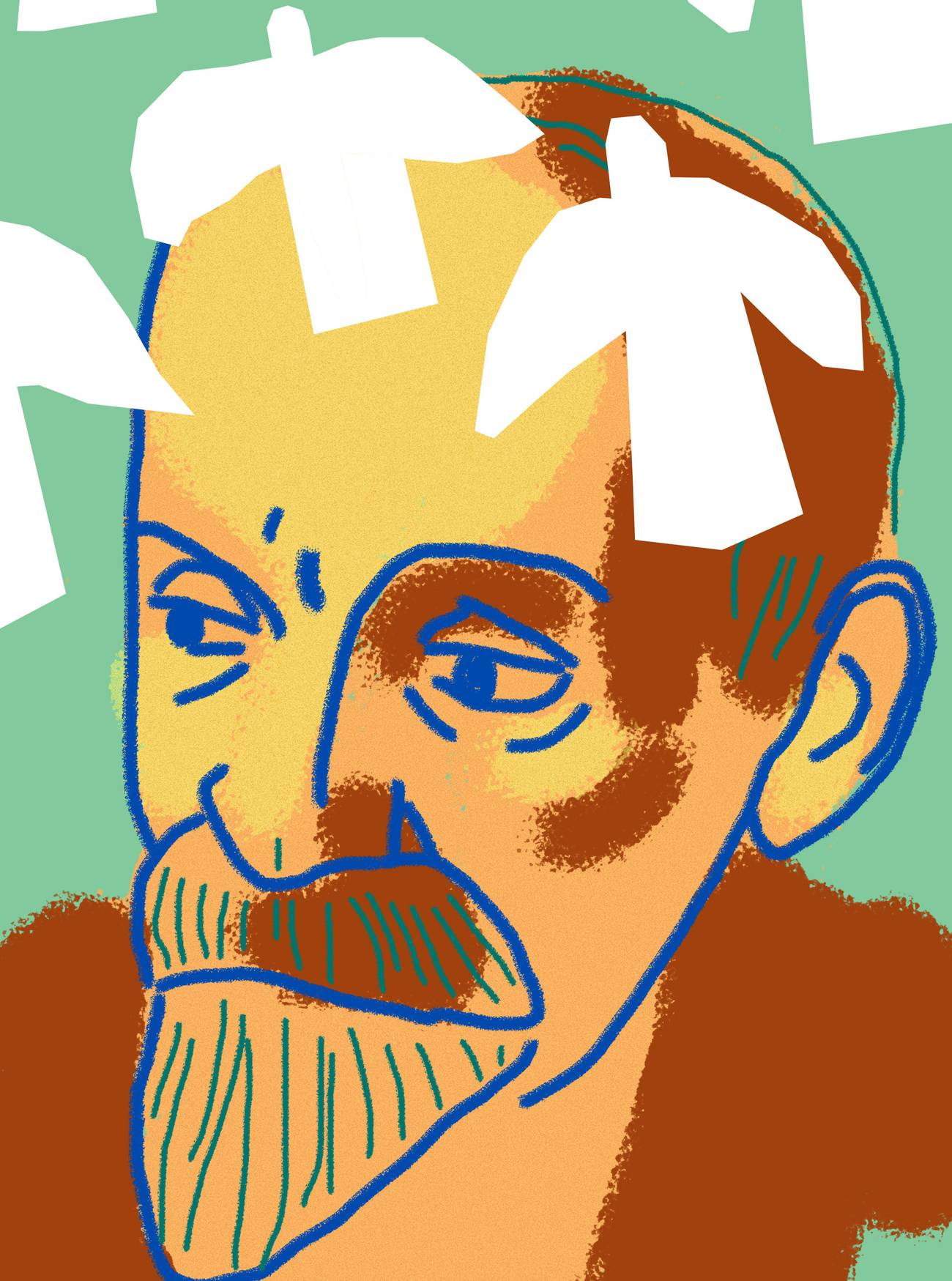The Lonely Prophet of Jewish Awakeness
Revisiting Lev Shestov’s radical uncertainty, at a time when facts are less compelling than ever




When Lev Izaakovich Schwarzmann, to use his birth name, died in Paris in November 1938, his single disciple, the poet Benjamin Fondane, confessed himself surprised to hear the Kaddish at his funeral. In the final pages of Fondane’s memoir, Rencontres avec Léon Chestov, the scene at Boulogne-Billancourt cemetery—less than two weeks after Kristallnacht—takes on a rather Chekhovian cast with a French rabbi, who has not been told he is burying the celebrated philosopher Lev Shestov, saying prayers “in a singing voice, without conviction” before a gathering of mourners largely without any connection to the literary and intellectual world Shestov inhabited. One of Shestov’s daughters (whose mother was a Russian Orthodox Christian) adds equivocally: “Papa aimait les prières à la mort—et comme il était israélite ...”
Nevertheless, as Matthew Beaumont notes early on in his new biographical study, Lev Shestov: Philosopher of the Sleepless Night, Shestov was in fact part of a community that recognized his contributions as distinctly Jewish. When he visited Jerusalem in 1936, he was welcomed and introduced at lectures by Gershom Scholem. Just a year before Shestov’s death, Emmanuel Lévinas declared in the pages of the Revue des Études Juives that although Shestov was “certainly not a philosopher of Judaism,” he was without any doubt a “Jewish philosopher,” and one whose thought returned “to the essential message of Judaism.” Nevertheless, Lévinas noted that Shestov’s “existential philosophy” did not “separate the Old Testament from the New.”
Shestov was indeed a Jewish thinker—or as Beaumont argues, an anti-philosopher—whose tone is reminiscent of the Hebrew prophets. Yet, most of his serious engagements were with Christian texts, from the Gospels and Paul via Luther and Pascal to Kierkegaard, Dostoevsky, and Nietzsche. Fondane reported seeing two books on the bedside table after Shestov’s death—a Russian Bible and Das System der Vedanta, a German translation of Hindu sacred texts. Fondane’s account of their encounters (the young poet first met the aging philosopher in 1924) confirms that Shestov fought a life-long battle with a wide array of texts and thinkers, invariably on the battleground that he formulated in the title of his last book, Athens and Jerusalem.
Shestov subjected the Jewish philosophers who were his contemporaries to the same visceral criticism that he directed at the rationalist line of succession beginning with Plato and Aristotle and culminating, in his view, with Edmund Husserl, to whose thought he devoted a fierce critique. This essay, “Memento Mori,” reportedly only increased the regard Husserl had for Shestov. One of the most generous impulses of Matthew Beaumont’s book is to bring Shestov’s lonely thought within shouting distance of better-known contemporaries like Walter Benjamin and Theodor Adorno, whose work echoes in Shestov’s own, though they never knew each other in life. Practicing a form of intellectual history that relies on wide and rigorous reading and sensitivity to glancing consonances and half-rhymes, the book does not make Shestov less strange or easier to assimilate (which he would have detested), but rather teases out of disparate pieces and unorchestrated gestures of counter-Enlightenment agitation a powerful argument for spiritual and political wakefulness. In this, it is very much a book for our time.
Beaumont starts by defusing the notion that his project can be subsumed into “wokeness” in its now-common applications. He deftly traces the woke movement back to its original Black American idiom, through a series of white appropriations that he argues have hollowed out the idea of being and staying awake as a political metaphor. An important aim of this book is to redeem the entire semantic field of wakefulness for use.
For Shestov, vigilance is a form of chosen suffering. In his essay on Pascal, “Gethsemane Night,” which is at the center of Beaumont’s study, he puts great emphasis on Pascal’s illness and (literal) insomnia and its effect on his thought. Shestov returns to one phrase from Pascal again and again in the essay: “Jesus will be in agony until the end of the world. There must be no sleeping until that time.” Beaumont’s prose takes on an incantatory quality like Shestov’s as he too adopts it as a refrain in his book: “No sleep ’til the end of the world.” Shestov takes Pascal to mean that we must not make peace with the world; we must reject the empirical, causal explanations of historical suffering just as Job rejected the consolations of his friends.
To refuse sleep (the stupor that Shestov associates with submission to logical order) is to hold open a gate to messianic transformation. To Shestov, scientific rationalism is a form of zombie-ism. One of his most important lessons is about learning to live in radical uncertainty, in anxiety, and terror. His mind tosses and turns on every page.
Forced by circumstance and character to occupy a kind of no man’s land (the wasteland is another central metaphor in Beaumont’s book), a succession of writers and thinkers including Albert Camus, who wrote about him in The Myth of Sisyphus, Emil Cioran, and Czeslaw Milosz, who found themselves outside clear contemporary factions and fashions found support in Shestov for their efforts to make their own ground fertile. Shestov’s argument against Hegel’s view of history—the real is the rational—can be seen as part of a battle against what Czeslaw Milosz in The Captive Mind called the “Hegelian sting” and described as the temptation to regard force triumphant as historical necessity.
Shestov was also an ally for modern poets—notably Paul Celan and Benjamin Fondane—who found in him a powerful defense of creative irrationalism. What Beaumont calls “supra-rationalism,” Celan, invoking both Shestov and Pascal in his famous Meridian speech, called “obscurity ... for the sake of an encounter.”
Beaumont explores in detail the relation between Shestov’s thought and the work of Walter Benjamin, the 20th-century master of the encounter, particularly in their views of history and redemption. He sees them as differing primarily in their respective focuses on the salvation of the individual and the collective. He identifies aesthetic commonalities in their identification of hopelessness as the beginning of real thought, and wakefulness as the only way to face history’s depredations. In Benjamin, wakefulness means the ability to face the “new dream-filled sleep” of capitalism—or as formulated in On the Concept of History, the “one single catastrophe” called progress, which is seen by the wide-eyed Angelus Novus as heaping “wreckage upon wreckage.”
Shestov imagines an angelic visitation among men differently. In “The Conquest of the Self-Evident,” an essay about Dostoevsky written to commemorate the writer’s centenary in 1921, Shestov derived his own vision, as Beaumont notes, from Avodah Zarah (20b), which Shestov identifies in his essay only as “a very wise old book.” The philosopher attributes to the writer of the passage a particular kind of “double vision”:
It happens sometimes that the Angel of Death, when he comes for a soul, sees that he has come too soon, that the man’s term of life is not yet expired; so he does not take the soul away, does not even show himself to it, but leaves the man one of the innumerable pairs of eyes with which his body is covered. And then the man sees strange and new things, more than other men see and more than he himself sees with his natural eyes; and he also sees, not as men see but as the inhabitants of other worlds see: that things do not exist “necessarily”, but “freely”, that they are and at the same time are not, that they appear when they disappear and disappear when they appear. The testimony of the old, natural eyes, “everybody’s” eyes, directly contradicts the testimony of the eyes left by the angel. But since all our other organs of sense, and even our reason, agree with our ordinary sight, and since the whole of human “experience,” individual and collective, supports it, the new vision seems to be outside the law, ridiculous, fantastic, the product of a disordered imagination. It seems only a step short of madness; not poetic madness … but the madness for which men are pent in cells. And then begins a struggle between two kinds of vision, a struggle of which the issue is as mysterious and uncertain as its origin.
If I have any regret about this study, it is that it mentions in passing but does not lend much of an ear to Shestov’s other onetime disciple, Rachel Bespaloff, whose final and fundamental disagreement with him does as much or more to illuminate his philosophy as does the more reverential writing of Benjamin Fondane. Like Fondane’s, her work remained unfinished, but her 1938 collection of essays, Cheminements et carrefours, dedicated to Shestov, seems to me very much in the spirit of Beaumont’s philosopher-walkers. Her beautiful text On the Iliad, reprinted by NYRB Classics in a volume with the better-known contemporaneous essay by Simone Weil, “The Iliad, or the Poem of Force” and an essay by Hermann Broch (who, as the author of The Sleepwalkers, also deserves to be included in the canon of European spiritual insomniacs) testifies to her deep engagement with both the Jewish and the Greek tradition.
One of his most important lessons is about learning to live in radical uncertainty, in anxiety, and terror.
Bespaloff advocates for an “Athens” less reductive than Shestov’s, a philosophical city capable of containing within itself and maintaining in creative tension the contradictions of individual existence in historical time without the kind of absolute negation that Shestov seeks. In the last section of On the Iliad, “Poets and Prophets,” Bespaloff presents a strong case against dividing the world of Homer and the Bible as Shestov does. In opposition to Weil, she argues that the real affinities between Athens and Jerusalem do not lie in Christianity and are not subject to a final synthesis: “To find the common ground of Greek and Jewish thought, one must look further back, to the great lyrics of Judaism, to Homer and the tragic poets. There are more real affinities ... between Job’s lamentations and Aeschylus’ threnodies than between Aristotle and the Gospel.” Even Shestov, I think, would agree with this last statement.
In an essay by Olivier Salazar-Ferrer on Bespaloff’s quarrel with Shestov and Fondane (included in the valuable 2006 collection Artists, Intellectuals and World War II) the question arises whether Bespaloff’s turning against Shestov arose from her doubts about his ostensibly Nietzschean call, in the years when fascism was rising to power, for the “overcoming of ethical values” in the name of spiritual transformation. To her, Shestov’s relentless attack on the rationalist tradition and what he saw as the tyranny of empirical knowledge could at that time serve only to undermine the few remaining buttresses against political chaos and brutality.
Readers drawn in by Shestov’s prophetic visions and the passionate interpretations of his students, now joined by Beaumont, face a similar question now, in the current political climate, when empirical fact often fails to persuade and both right- and left-wing movements seem to see the hope of an exit from history’s violent injustices in radical rupture. But is that really enough to wake us up?
Alissa Valles is the author of the poetry collections Hospitium and Orphan Fire and a translator from Russian and Polish.